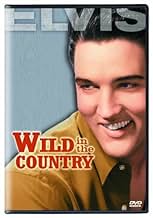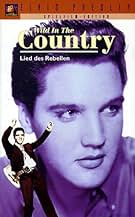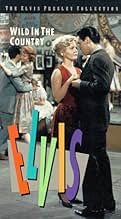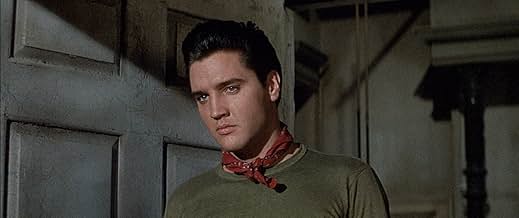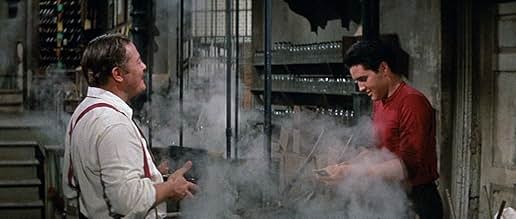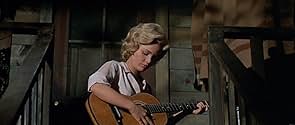VALUTAZIONE IMDb
6,3/10
2232
LA TUA VALUTAZIONE
Aggiungi una trama nella tua linguaA troubled young man discovers that he has a knack for writing when a counselor encourages him to pursue a literary career.A troubled young man discovers that he has a knack for writing when a counselor encourages him to pursue a literary career.A troubled young man discovers that he has a knack for writing when a counselor encourages him to pursue a literary career.
Charles Arnt
- Mr. Parsons
- (non citato nei titoli originali)
Mark Bailey
- Sheriff
- (non citato nei titoli originali)
Walter Baldwin
- Mr. Spangler
- (non citato nei titoli originali)
Joe Butham
- Mr. Dace
- (non citato nei titoli originali)
Pat Buttram
- Mr. Longstreet
- (non citato nei titoli originali)
Harry Carter
- Bartender
- (non citato nei titoli originali)
Linden Chiles
- Doctor
- (non citato nei titoli originali)
Recensioni in evidenza
A beautiful and passionate screenplay by Clifford Odets. Elvis plays a brawling delinquent with a hidden literary talent. Three women compete for his attention, lust and future. Millie Perkins plays the childhood sweetheart. Tuesday Weld is outstanding as the seductive cousin. The older of the three, Hope Lange, is an understanding psychiatrist trying to lead Elvis' character to college. The songs in this drama are limited, but highlighted by "I Slipped, I Stumbled, I Fell". An emotional performance turned in by Elvis. Some say this is one of his best movies. Watch it again to appreciate.
J.R. Salamanca's book "The Lost Country", adapted for the screen by Clifford Odets (!), becomes decent though somewhat stodgy melodrama featuring Elvis Presley as southern delinquent who shows promise as a writer, counseled by a female psychologist who believes in him. Critics at the time were calling for Elvis to start doing some decent dramatic work, yet when this picture was released it was mostly ignored (it is often cited as the one Presley-vehicle which failed to turn a profit). The females in the cast (Hope Lange, Tuesday Weld and Millie Perkins) are strong screen-matches for Elvis, and the plotting is good when it isn't being overripe. As for the star, he does his typical thing: singing just a few songs, but performing in his usual shy and self-conscious, overly-polite low key. **1/2 from ****
This is yet another great Elvis movie. It's great to see how a young kid who is dealt a very bad hand in life, with an abusive father and brother, with the death of his mother as a child and being guilty until proven innocent by the town comes out on top. It has good songs, but is not a musical. Again another great plot with a strong supporting cast, with Tuesday Weld and Gary Lockwood to name a few. I give this movie 4 and a half stars.
"A troubled young man discovers that he has a knack for writing when a counselor encourages him to pursue a literary career." Do me a favour: Do not think of this movie as any other Elvis flick, because this is one of the best classic films I've seen. Well, he sings a couple songs to his lovers and he gets into a couple of fights, but here it just doesn't happen randomly. The plot is excellent and Elvis blew me away with his acting. There's one specific scene where he's sharing stories about his dead mother with Hope Lange and it almost brought me to tears. His acting was very natural, as was Hope Lange's, Tuesday Weld's and Millie Perkins'. This is a fantastic movie and I hope you'll enjoy it as much as I did.
Apparently Elvis didn't think much of any of his films. According to "Being Elvis", a recent biography by Ray Connolly, Elvis hated the repetitive nature of the plots - same story different location. He felt he had never been given serious roles where he could show what he could do as an actor - he certainly didn't have to compete with Paul Newman and Steve McQueen for the roles in "Fun in Acapulco" and "Girls, Girls, Girls".
Although he definitely had a point about the films toward the end of his Hollywood career, a number of his earlier films were actually based on novels -"King Creole", "Follow That Dream", "Flaming Star" and this one, "Wild in the Country" - stories that had more substance going in.
"Wild in the Country" has elements we expect from an Elvis picture, but then it gets complicated. This was made a few years after James Dean and Sal Mineo had shown that troubled teens were now a fact of life. Elvis plays Glenn Tyler, one of the troubled. After being placed on probation for injuring his brother in a fight, he receives counselling from psychologist, Irene Sperry (Hope Lange).
The not inconsiderable charms of Millie Perkins and Tuesday Weld can't compete when Irene discovers that Glenn has a talent for writing and Glenn discovers that he has feelings for the older woman. In reality, Hope Lange was only two years older than 26 year-old Elvis.
The film has a script by Clifford Odets, although one suspects he would not have considered "Wild in the Country" as his finest hour. He originally had Irene Sperry's character committing suicide at the end, it was changed, but it possibly reflected how Odets felt about selling out to Hollywood.
However the film has a lot going on with well-defined characters and great locations in the Napa valley. If Elvis felt that most of his films only had stories to separate the songs, that was not the case in "Wild in the Country", there are a few songs, but the film is mainly the drama he craved.
I find a lot of his films are fun to watch in the same way as "Beach Party" movies are. But there are a handful of films that have a depth he may not have appreciated at the time - "Wild in the Country" is one of them.
Although he definitely had a point about the films toward the end of his Hollywood career, a number of his earlier films were actually based on novels -"King Creole", "Follow That Dream", "Flaming Star" and this one, "Wild in the Country" - stories that had more substance going in.
"Wild in the Country" has elements we expect from an Elvis picture, but then it gets complicated. This was made a few years after James Dean and Sal Mineo had shown that troubled teens were now a fact of life. Elvis plays Glenn Tyler, one of the troubled. After being placed on probation for injuring his brother in a fight, he receives counselling from psychologist, Irene Sperry (Hope Lange).
The not inconsiderable charms of Millie Perkins and Tuesday Weld can't compete when Irene discovers that Glenn has a talent for writing and Glenn discovers that he has feelings for the older woman. In reality, Hope Lange was only two years older than 26 year-old Elvis.
The film has a script by Clifford Odets, although one suspects he would not have considered "Wild in the Country" as his finest hour. He originally had Irene Sperry's character committing suicide at the end, it was changed, but it possibly reflected how Odets felt about selling out to Hollywood.
However the film has a lot going on with well-defined characters and great locations in the Napa valley. If Elvis felt that most of his films only had stories to separate the songs, that was not the case in "Wild in the Country", there are a few songs, but the film is mainly the drama he craved.
I find a lot of his films are fun to watch in the same way as "Beach Party" movies are. But there are a handful of films that have a depth he may not have appreciated at the time - "Wild in the Country" is one of them.
Lo sapevi?
- QuizElvis Presley's best performances are invariably cited as his three forays into drama, which were natural matches for his chief acting characteristics: petulance, intensity and hidden vulnerability. Not coincidentally, music takes a back seat in most of these three vehicles. In King Creole (1958), based on the plot about a would-be singer, Presley sings a full score of songs. In Flaming Star (1960), there is just one song in the plot. In Wild in the Country (1961), there is only one 'serenade' per female character. The songs were included largely so that, at the very least, an Extended Play soundtrack album could be released for each film and record sales would not be negatively impacted by the time the dramas took to film. King Creole, of course, was one of the best selling albums of Presley's career, but in the case of both Flaming Star and Wild in the Country, no soundtrack album was released outside of a 45rpm single.
- BlooperIn the Elvis drunk scene, when he douses the window with the water hose, the in-between close up shot of the window pane (showing close up the women inside looking out) has no water residue / dripping: next shot back out to Elvis' stance (still water hose spraying) and it's (rightly) soaked.
- Citazioni
Betty Lee Parsons: I have no intention of wasting sympathy on him.
Glenn Tyler: Sympathy is never wasted, Betty Lee. One way or another, you get it back, or so it says in the Book.
- ConnessioniFeatured in Elvis in the Movies (1990)
- Colonne sonoreWild in the Country
by Hugo Peretti, Luigi Creatore and George David Weiss (as George Weiss)
Performed by Elvis Presley (uncredited)
I più visti
Accedi per valutare e creare un elenco di titoli salvati per ottenere consigli personalizzati
- How long is Wild in the Country?Powered by Alexa
Dettagli
- Tempo di esecuzione
- 1h 54min(114 min)
- Colore
- Mix di suoni
- Proporzioni
- 2.35 : 1
Contribuisci a questa pagina
Suggerisci una modifica o aggiungi i contenuti mancanti



